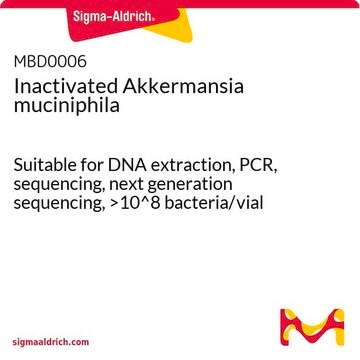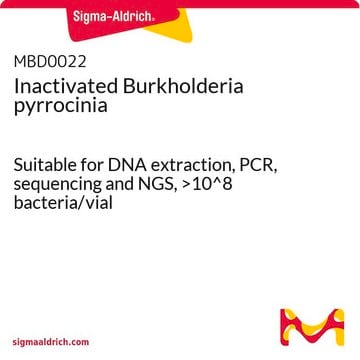MBD0001
Microbial DNA standard from Akkermansia muciniphila
Suitable for PCR, sequencing and NGS, 10 ng/μL
Se connecterpour consulter vos tarifs contractuels et ceux de votre entreprise/organisme
About This Item
Code UNSPSC :
41105500
Nomenclature NACRES :
NA.24
Produits recommandés
Niveau de qualité
Forme
liquid
Concentration
10 ng/μL
Technique(s)
DNA extraction: suitable
DNA sequencing: suitable
PCR: suitable
Conditions d'expédition
ambient
Température de stockage
−20°C
Catégories apparentées
Description générale
Standardization of sample analysis is currently needed in microbiome genomics research workflow. Lack of standardization can lead to biases and errors in common processes during sample preparation and analysis such as sample amplification, sequencing and bioinformatics analyses.1 Akkermansia muciniphila genomic DNA microbial standard can serve as standard for benchmarking the performance along the workflow of microbiomics or meta-genomics analyses and as a tool to increase reproducibility and allow comparison of results obtained by different labs.
Akkermansia muciniphila is a gram negative, anaerobic, non motile, non spore forming and oval shaped bacterium. A. muciniphila inhabits the gastrointestinal tracts of more than 90% of adults and constitutes 1 to 4% of the fecal microbiota.2 A. muciniphila level was suggested to be a biomarker for a healthy intestin. 3
A. muciniphila degrades mucus and utilizes it as a carbon/nitrogen source. Consequently, the host produces additional mucus while the bacterium produces oligosaccharides and Short Chain Fatty Acids (SCFAs) that can be utilized by the host and trigger the immune system. An additional protective effect of the SCFA is stimulation of mucus-associated microbiota growth, that serves as a barrier against penetration of pathogens to intestinal cells. 2,4
Read here how to use our standards to ensure data integrity for your microbiome research.
Akkermansia muciniphila is a gram negative, anaerobic, non motile, non spore forming and oval shaped bacterium. A. muciniphila inhabits the gastrointestinal tracts of more than 90% of adults and constitutes 1 to 4% of the fecal microbiota.2 A. muciniphila level was suggested to be a biomarker for a healthy intestin. 3
A. muciniphila degrades mucus and utilizes it as a carbon/nitrogen source. Consequently, the host produces additional mucus while the bacterium produces oligosaccharides and Short Chain Fatty Acids (SCFAs) that can be utilized by the host and trigger the immune system. An additional protective effect of the SCFA is stimulation of mucus-associated microbiota growth, that serves as a barrier against penetration of pathogens to intestinal cells. 2,4
Read here how to use our standards to ensure data integrity for your microbiome research.
Application
Suitable for Quantitative standard for PCR, Sequencing and NGS
Caractéristiques et avantages
- Individual microbial standard for microbiomics and meta-genomics workflow
- Suitable standard for PCR, sequencing and NGS
- Improve Bioinformatics analyses
- Increases reproducibility
- Compare results lab to lab
Forme physique
Liquid - The genomic DNA is provided at ≥10 ng/μL concentration in TE buffer pH 8.0
Autres remarques
It is recommended to avoid freeze thaw cycles of this product.
Code de la classe de stockage
12 - Non Combustible Liquids
Classe de danger pour l'eau (WGK)
WGK 1
Point d'éclair (°F)
Not applicable
Point d'éclair (°C)
Not applicable
Faites votre choix parmi les versions les plus récentes :
Certificats d'analyse (COA)
Lot/Batch Number
Vous ne trouvez pas la bonne version ?
Si vous avez besoin d'une version particulière, vous pouvez rechercher un certificat spécifique par le numéro de lot.
Déjà en possession de ce produit ?
Retrouvez la documentation relative aux produits que vous avez récemment achetés dans la Bibliothèque de documents.
Chin Wen Png et al.
The American journal of gastroenterology, 105(11), 2420-2428 (2010-07-22)
Mucosa-associated bacteria are increased in inflammatory bowel disease (IBD), which suggests the possibility of an increased source of digestible endogenous mucus substrate. We hypothesized that mucolytic bacteria are increased in IBD, providing increased substrate to sustain nonmucolytic mucosa-associated bacteria. Mucolytic
Muriel Derrien et al.
International journal of systematic and evolutionary microbiology, 54(Pt 5), 1469-1476 (2004-09-25)
The diversity of mucin-degrading bacteria in the human intestine was investigated by combining culture and 16S rRNA-dependent approaches. A dominant bacterium, strain MucT, was isolated by dilution to extinction of faeces in anaerobic medium containing gastric mucin as the sole
Clara Belzer et al.
The ISME journal, 6(8), 1449-1458 (2012-03-23)
The human intestinal tract is colonized by a myriad of microbes that have developed intimate interactions with the host. In healthy individuals, this complex ecosystem remains stable and resilient to stressors. There is significant attention on the understanding of the
J Paul Brooks et al.
BMC microbiology, 15, 66-66 (2015-04-17)
Characterizing microbial communities via next-generation sequencing is subject to a number of pitfalls involving sample processing. The observed community composition can be a severe distortion of the quantities of bacteria actually present in the microbiome, hampering analysis and threatening the
Notre équipe de scientifiques dispose d'une expérience dans tous les secteurs de la recherche, notamment en sciences de la vie, science des matériaux, synthèse chimique, chromatographie, analyse et dans de nombreux autres domaines..
Contacter notre Service technique








